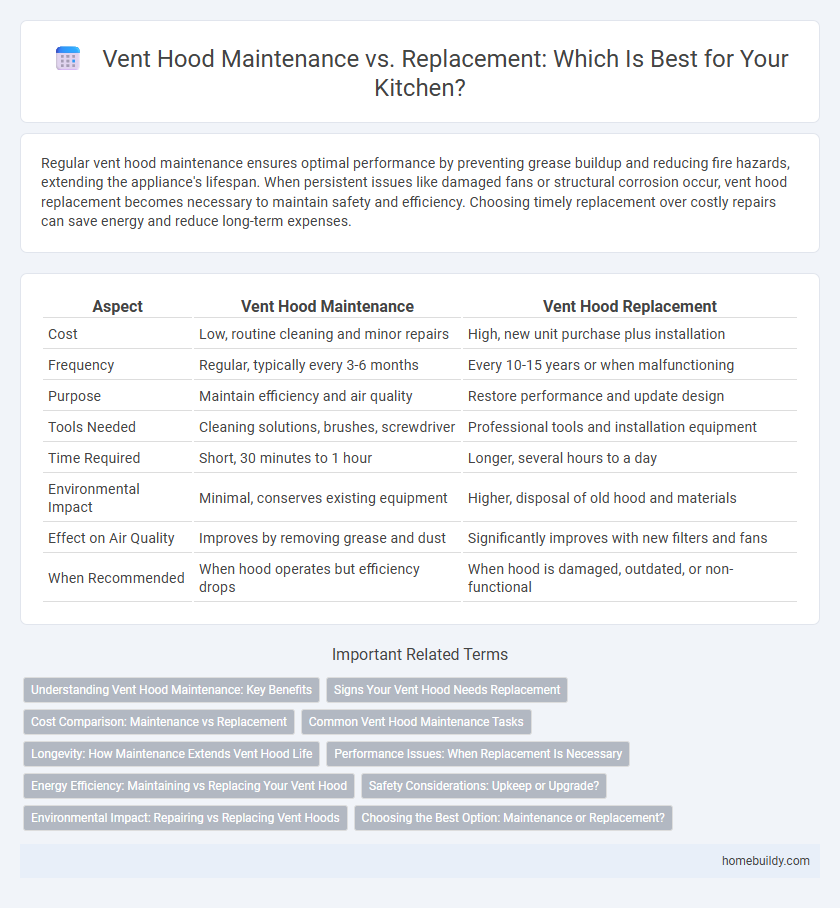Regular vent hood maintenance ensures optimal performance by preventing grease buildup and reducing fire hazards, extending the appliance's lifespan. When persistent issues like damaged fans or structural corrosion occur, vent hood replacement becomes necessary to maintain safety and efficiency. Choosing timely replacement over costly repairs can save energy and reduce long-term expenses.
Table of Comparison
| Aspect | Vent Hood Maintenance | Vent Hood Replacement |
|---|---|---|
| Cost | Low, routine cleaning and minor repairs | High, new unit purchase plus installation |
| Frequency | Regular, typically every 3-6 months | Every 10-15 years or when malfunctioning |
| Purpose | Maintain efficiency and air quality | Restore performance and update design |
| Tools Needed | Cleaning solutions, brushes, screwdriver | Professional tools and installation equipment |
| Time Required | Short, 30 minutes to 1 hour | Longer, several hours to a day |
| Environmental Impact | Minimal, conserves existing equipment | Higher, disposal of old hood and materials |
| Effect on Air Quality | Improves by removing grease and dust | Significantly improves with new filters and fans |
| When Recommended | When hood operates but efficiency drops | When hood is damaged, outdated, or non-functional |
Understanding Vent Hood Maintenance: Key Benefits
Regular vent hood maintenance enhances air quality by efficiently removing smoke, grease, and odors, reducing fire hazards in commercial and residential kitchens. Timely cleaning and inspection prevent costly breakdowns and extend the lifespan of the vent hood system. Proper maintenance ensures compliance with safety regulations and improves energy efficiency, lowering operational costs.
Signs Your Vent Hood Needs Replacement
Signs your vent hood needs replacement include persistent grease buildup that cannot be cleaned, unusual noises during operation, and decreased airflow efficiency. Visible damage such as rust, cracks, or broken fan blades also indicates the vent hood is no longer functioning properly. Frequent breakdowns and electrical issues suggest maintenance is no longer sufficient, and replacement is necessary to ensure kitchen safety and ventilation performance.
Cost Comparison: Maintenance vs Replacement
Vent hood maintenance typically costs between $100 and $300 annually, covering filter cleaning and motor lubrication, which extends the appliance's lifespan effectively. Replacement expenses range from $500 to $2,000, influenced by the vent hood size, style, and installation complexity. Regular maintenance reduces the frequency of costly replacements, making it a budget-friendly option for long-term kitchen ventilation management.
Common Vent Hood Maintenance Tasks
Common vent hood maintenance tasks include regularly cleaning grease filters, inspecting and replacing charcoal filters, and checking the exhaust fan for proper operation. Routine cleaning prevents grease buildup that can reduce airflow and create fire hazards, while periodic filter replacement ensures optimal air purification. Neglecting maintenance can lead to decreased efficiency and the need for premature vent hood replacement.
Longevity: How Maintenance Extends Vent Hood Life
Regular vent hood maintenance significantly extends its lifespan by preventing grease buildup, corrosion, and mechanical failures, which can deteriorate performance over time. Cleaning filters, inspecting ductwork, and servicing fans reduce wear and tear, maintaining optimal airflow and energy efficiency. Neglecting maintenance accelerates the need for costly vent hood replacement due to irreversible damage and declining functionality.
Performance Issues: When Replacement Is Necessary
Vent hood performance issues such as persistent grease buildup, inefficient airflow, and excessive noise often signal the need for replacement rather than maintenance. If cleaning and repairing filters or fans fail to restore optimal ventilation or if safety sensors malfunction repeatedly, replacement ensures reliable operation and improved indoor air quality. Professional assessment can identify when performance degradation surpasses maintenance capabilities, justifying investment in a new vent hood system.
Energy Efficiency: Maintaining vs Replacing Your Vent Hood
Regular vent hood maintenance ensures optimal airflow and reduces energy consumption by keeping filters clean and motors running efficiently. Over time, outdated or damaged vent hoods lose energy efficiency due to wear, corrosion, and obsolete technology. Replacing an old vent hood with a modern, energy-efficient model can significantly lower utility costs and improve overall kitchen ventilation performance.
Safety Considerations: Upkeep or Upgrade?
Regular vent hood maintenance ensures effective removal of smoke, grease, and harmful fumes, reducing fire hazards and improving indoor air quality. Ignoring upkeep can lead to clogged filters and malfunctioning fans, increasing the risk of kitchen fires and exposure to toxic gases. Replacement becomes necessary when structural corrosion or impaired ventilation compromises safety, making a new vent hood essential for reliable protection.
Environmental Impact: Repairing vs Replacing Vent Hoods
Repairing vent hoods significantly reduces environmental impact by minimizing waste and conserving resources compared to full replacement. Maintenance extends the lifespan of existing components, lowering the demand for new materials and energy consumption associated with manufacturing and disposal. Opting for repair over replacement supports sustainable practices and decreases the overall carbon footprint of kitchen ventilation systems.
Choosing the Best Option: Maintenance or Replacement?
Regular vent hood maintenance extends the lifespan and efficiency by preventing grease buildup, ensuring proper airflow, and avoiding costly repairs. However, signs like persistent noise, decreased suction power, or visible damage indicate replacement is more cost-effective for optimal kitchen safety and performance. Evaluating the frequency of repairs and energy consumption helps determine whether maintenance or full vent hood replacement is the best option.
Vent hood maintenance vs Vent hood replacement Infographic

 homebuildy.com
homebuildy.com